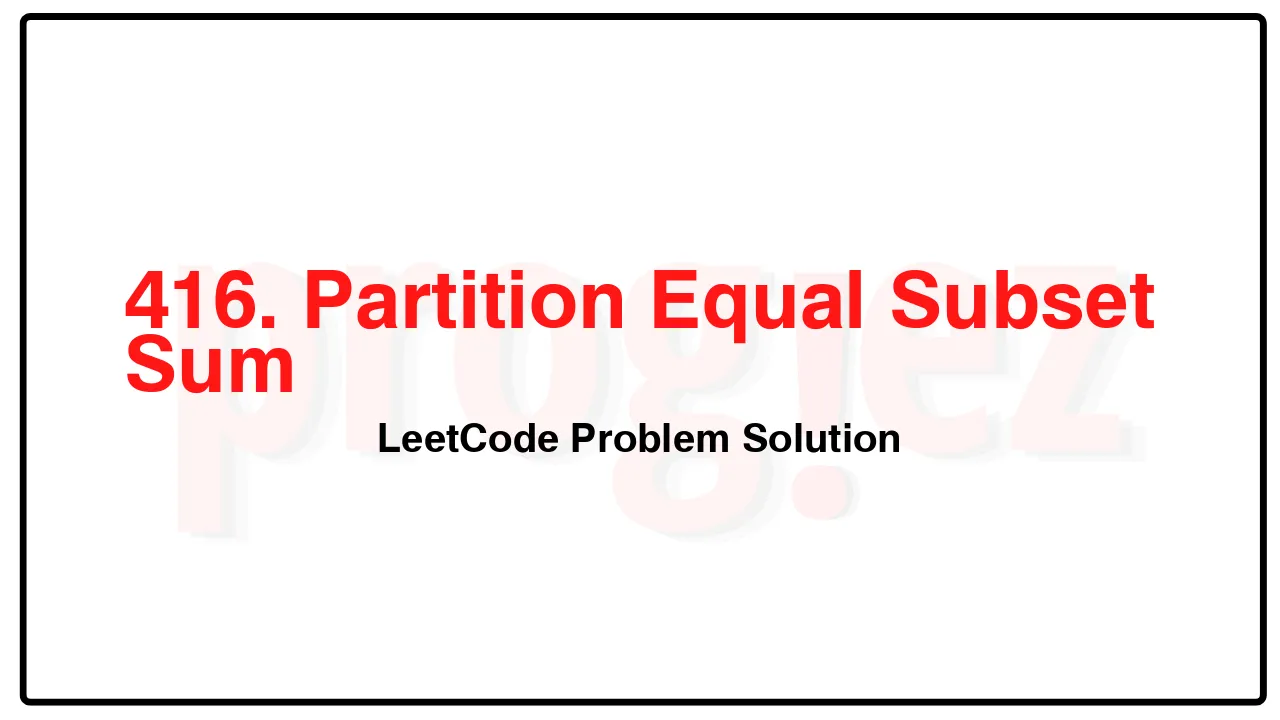416. Partition Equal Subset Sum LeetCode Solution
In this guide, you will get 416. Partition Equal Subset Sum LeetCode Solution with the best time and space complexity. The solution to Partition Equal Subset Sum problem is provided in various programming languages like C++, Java, and Python. This will be helpful for you if you are preparing for placements, hackathons, interviews, or practice purposes. The solutions provided here are very easy to follow and include detailed explanations.
Table of Contents
- Problem Statement
- Complexity Analysis
- Partition Equal Subset Sum solution in C++
- Partition Equal Subset Sum solution in Java
- Partition Equal Subset Sum solution in Python
- Additional Resources

Problem Statement of Partition Equal Subset Sum
Given an integer array nums, return true if you can partition the array into two subsets such that the sum of the elements in both subsets is equal or false otherwise.
Example 1:
Input: nums = [1,5,11,5]
Output: true
Explanation: The array can be partitioned as [1, 5, 5] and [11].
Example 2:
Input: nums = [1,2,3,5]
Output: false
Explanation: The array cannot be partitioned into equal sum subsets.
Constraints:
1 <= nums.length <= 200
1 <= nums[i] <= 100
Complexity Analysis
- Time Complexity: O(nk), where k = \Sigma |\texttt{nums[i]}| / 2
- Space Complexity: O(nk)
416. Partition Equal Subset Sum LeetCode Solution in C++
class Solution {
public:
bool canPartition(vector<int>& nums) {
const int sum = accumulate(nums.begin(), nums.end(), 0);
if (sum % 2 == 1)
return false;
return knapsack(nums, sum / 2);
}
private:
bool knapsack(const vector<int>& nums, int subsetSum) {
const int n = nums.size();
// dp[i][j] := true if j can be formed by nums[0..i)
vector<vector<bool>> dp(n + 1, vector<bool>(subsetSum + 1));
dp[0][0] = true;
for (int i = 1; i <= n; ++i) {
const int num = nums[i - 1];
for (int j = 0; j <= subsetSum; ++j)
if (j < num)
dp[i][j] = dp[i - 1][j];
else
dp[i][j] = dp[i - 1][j] || dp[i - 1][j - num];
}
return dp[n][subsetSum];
}
};
/* code provided by PROGIEZ */416. Partition Equal Subset Sum LeetCode Solution in Java
class Solution {
public boolean canPartition(int[] nums) {
final int sum = Arrays.stream(nums).sum();
if (sum % 2 == 1)
return false;
return knapsack(nums, sum / 2);
}
private boolean knapsack(int[] nums, int subsetSum) {
final int n = nums.length;
// dp[i][j] := true if j can be formed by nums[0..i)
boolean[][] dp = new boolean[n + 1][subsetSum + 1];
dp[0][0] = true;
for (int i = 1; i <= n; ++i) {
final int num = nums[i - 1];
for (int j = 0; j <= subsetSum; ++j)
if (j < num)
dp[i][j] = dp[i - 1][j];
else
dp[i][j] = dp[i - 1][j] || dp[i - 1][j - num];
}
return dp[n][subsetSum];
}
}
// code provided by PROGIEZ416. Partition Equal Subset Sum LeetCode Solution in Python
class Solution:
def canPartition(self, nums: list[int]) -> bool:
summ = sum(nums)
if summ % 2 == 1:
return False
return self.knapsack_(nums, summ // 2)
def knapsack_(self, nums: list[int], subsetSum: int) -> bool:
n = len(nums)
# dp[i][j] := True if j can be formed by nums[0..i)
dp = [[False] * (subsetSum + 1) for _ in range(n + 1)]
dp[0][0] = True
for i in range(1, n + 1):
num = nums[i - 1]
for j in range(subsetSum + 1):
if j < num:
dp[i][j] = dp[i - 1][j]
else:
dp[i][j] = dp[i - 1][j] or dp[i - 1][j - num]
return dp[n][subsetSum]
# code by PROGIEZAdditional Resources
- Explore all LeetCode problem solutions at Progiez here
- Explore all problems on LeetCode website here
Happy Coding! Keep following PROGIEZ for more updates and solutions.